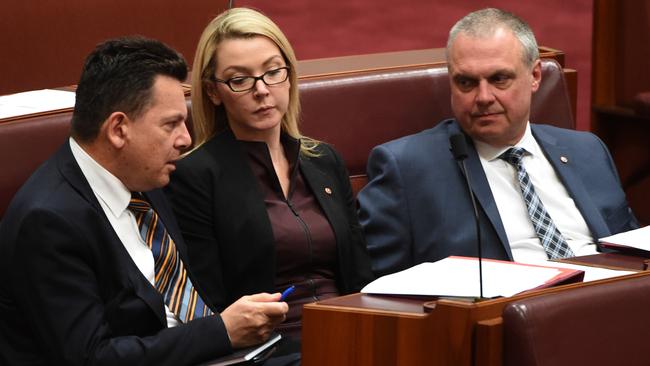IR reforms on brink of victory after concessions to Xenophon
The Turnbull government is on the brink of victory in its bid to legislate two workplace reforms.

The Turnbull government is on the brink of victory in its bid to legislate two workplace reforms as it offers concessions to Nick Xenophon and other Senate crossbenchers to cement their support when parliament resumes today.
UPDATE: Xenophon says NXT ‘not there yet’ on IR reforms
The government is “very close” to a deal that amends the workplace bills to protect whistleblowers and toughen audits while also meeting calls for a “security of payments” regime to help building industry subcontractors.
But the government is holding out against Labor amendments that could weaken the new sanctions on union officials who misuse funds, with Bill Shorten trying to put the corporate regulator in charge of investigations rather than set up a new commission to police the sector.
The government is heading into parliament’s final fortnight of the year with growing support in the Senate for the reforms, including the restoration of the Australian Building and Construction Commission to crack down on illegal activity on building sites.
The Australian has been told the government has largely accepted Senator Xenophon’s proposed amendments to its workplace bills, putting it within sight of the eight crossbench votes it needs to pass them over the objections of Labor and the Greens.
Senator Xenophon’s plan to give building subcontractors a stronger way to chase bad debts could also win support from Victorian independent Derryn Hinch, while Pauline Hanson’s One Nation is already backing the workplace reforms to curb union power.
Those involved in the talks said the government was likely to secure a majority within days for its plan to set up a registered organisations commission to oversee unions and employer groups.
The government was adamant last night that a new agency was needed to halt the misuse of member funds — as seen in scandals surrounding Craig Thomson and other officials at the Health Services Union — and that it will not accept Labor’s proposal to give the task to the Australian Securities & Investments Commission instead.
The clash with Labor appears set to drag out the fight over the second workplace bill, to restore the ABCC, for days after the government tries to launch debate on the reform tomorrow.
Senator Xenophon, who met Employment Minister Michaelia Cash late yesterday to negotiate the changes, said he wanted subcontractors to have a faster way to seek redress if major building companies did not pay them.
“If there’s a dispute you should be able to have it resolved expeditiously, cost-effectively and fairly,” he said.
The existing system of private adjudication to settle payment disputes would be replaced with a federal system under the building code, an existing power to set standards for contractors across the construction sector.
Senator Xenophon and Senator Hinch said there would be no call on taxpayer funds to support payments for subcontractors.
“Protection for tradies and subbies is very important, but the burden shouldn’t be on the taxpayers — it should be on the employers, the main contractors,” Senator Hinch said. “And they can take out insurance to cover themselves.”
Senator Hinch cautioned that it was too soon to predict where the final numbers would fall on the workplace bills, while Senator Xenophon said he did not want people to get “too excited” over a deal when talks were continuing.
In a late obstacle to an agreement, Senator Xenophon warned the government’s retreat on environmental flows in the Murray River could jeopardise negotiations on other issues, saying if the government did not “honour its word” on one issue he may not be able to trust it on another.
Liberal Democratic Party senator David Leyonhjelm has been acting as a go-between in the talks over the workplace bills, putting some of Labor’s proposals to the government.
“I inadvertently found myself talking to each side, and then advising each side about what the other one was talking about,” he said.
“This means there is a degree of agreement that means the ROC bill passes.”
Labor will confirm today that it will move a series of amendments to the ROC bill to exempt volunteers, to protect whistleblowers, to toughen the role of auditors, to reduce the disclosure amount for political donations from $13,200 to $1000 and to make ASIC the regulator for the bill.
The government sees the donations reform as completely separate from the union governance issues and is not inclined to accept the Labor amendment, while it will also reject the ASIC proposal.
The government is also gaining support for its changes to paid parental leave by proposing a compromise to increase taxpayer-funded leave from 18 to 20 weeks while stopping double dipping where new parents use the public scheme as well as support from their employer.
Under the proposed new system, mothers would not be able to access the government scheme if they receive 20 weeks or more of parental leave from their employer.
“Whether it’s enough in the right direction at this point, I can’t say,” said Nick Xenophon Team MP Rebekha Sharkie.
Senator Hanson and senator Malcolm Roberts have indicated they will back the key industrial relations reforms, while colleague Brian Burston has been unequivocal in his support for the bills.
But their West Australian colleague Rodney Culleton, who is due to attend a High Court directions hearing today as he faces questions over the validity of his election, remains undecided.
Senator Culleton said he would discuss the IR bills and a banking royal commission with Bill Shorten tomorrow but did not think it was “worth bringing in another commissioner” to oversee the construction industry.
Asked yesterday if Senator Hanson was inclined to support the ABCC and ROC, her chief of staff James Ashby said: “You’re jumping the gun there.”
Senator Burston believed all four of the party’s senators would ultimately vote for the two pieces of legislation, which triggered the double-dissolution election.
“I went to a function with Pauline last night and she’s certainly supporting it, and Malcolm Roberts as far as I’m aware. Rod Culleton I’m sure will be on side as well,” he said.
Senator Burston said the ROC bill had “better prospects” of passing the Senate than the ABCC, which he put at a 60-40 chance.
One Nation has backed independent senator Jacqui Lambie’s push for a 10.5 per cent backpacker tax but Senator Burston flagged a possible “middle ground” position with the government, which wants to impose a 19 per cent tax on the overseas workers.
“Fourteen per cent or 15 per cent might be a reasonable compromise,” he said.
Senator Hanson has also noted farming groups are supportive of a 12 per cent to 15 per cent tax to “better ensure backpackers continue to come to Australia to work on regional farms where Aussies simply don’t work”, but says the party will continue to back Senator Lambie’s proposal.




To join the conversation, please log in. Don't have an account? Register
Join the conversation, you are commenting as Logout